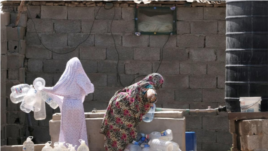04 July, 2019
Fighting over control of Libya's rich oil supply has led to another major crisis – a severe shortage of safe drinking water.
Libya's water problems have become common during eight years of unrest following the ouster of former leader Muammar Gaddafi.
Even before the unrest, Libya suffered from low water supplies. The country sits in a desert with low rainfall but has high water demand for use in agriculture and industry.
But current fighting between warring forces seeking control of the capital, Tripoli, is causing a wider water crisis.
The battles involve forces sent by two competing administrations seeking to take control of all Libya. One side is led by the internationally recognized government in the west, known as the Government of National Accord. The other, in the east, is led by Field Marshal Khalifa Haftar, who heads the Libyan National Army.

A Libyan woman displaced from the town of Tawergha fills containers with water at a displaced camp in Benghazi, Libya, on June 19, 2019. REUTERS/Esam Omran Al-Fetori
Fighting broke out in early April, when Haftar declared he would take the western part of Tripoli by force, and unite the country under his group. Forces supporting the Government of National Accord are fighting against the attacks, with neither side showing signs of giving up.
In western Libya, finding clean water has become difficult because both the power and water control systems have been heavily damaged.
Usama Mohamed Dokali is a restaurant worker in Tripoli. He told the Reuters news service that the water shortage has been worsening.
"Drinkable water is a daily issue for my family." He added that he buys bottled water when he can and sometimes gets water from an aid group when he has no more money. Other people fill bottles from wells and hope for the best.
Continued fighting and looting have made the situation worse. Armed groups have even used water as a weapon of war. In May, gunmen pressing officials to release a detained relative forced water workers to turn off supplies to all of Tripoli for two days.
The United Nations has warned all sides that water should not become a weapon of war. But the water system is already badly damaged in western Libya, Reuters reported. The news service said the information was based on unpublished reports by local water officials and the United Nations Children's Agency, or UNICEF.
Even local bottled water has become polluted, Reuters reported.
Libyan water officials warned of the dangers of water shortages during a presentation in March to international organizations. If the damage does not get fixed, there could be a "sudden, unexpected, uncontrollable and un-prepared for" shutdown of the main water pipeline system, the officials said. They warned of "catastrophic" results if this happens because no backup water supply system exists.
"An estimated 4 million people would be deprived of access to safe water," UNICEF Libya spokesman Mostafa Omar told Reuters. He warned that such a crisis would likely increase the spread of diseases like cholera, hepatitis A and diarrhea.
I'm Bryan Lynn.
Reuters reported on this story. Bryan Lynn adapted the report for VOA Learning English. Ashley Thompson was the editor.
We want to hear from you. Write to us in the Comments section, and visit 51VOA.COM.
_______________________________________________________________
Words in This Story
loot – v. to steal from shops or houses during war or conflict
catastrophic – adj. causing a log of suffering or destruction
deprive – v. take something important or necessary away from someone or something
access – n. the right or ability to approach, enter, or use